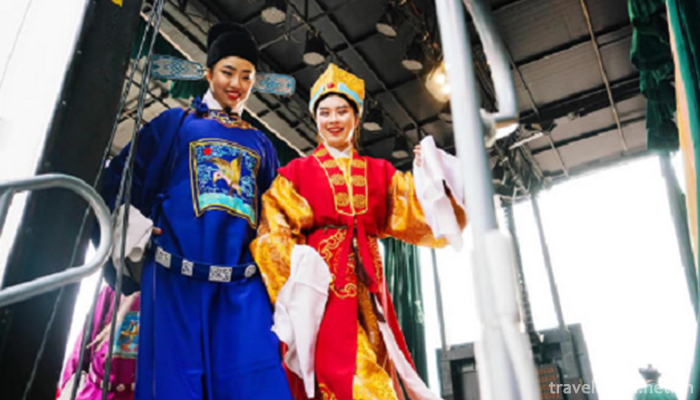Yangju Opera
Yangju Opera
Yangju, a local traditional drama in Yangzhou City, Jiangsu Province, is one of the national intangible cultural heritage. Yangzhou Opera, formerly known as "Weiyang Opera", is popular in Yangzhou, Zhenjiang, Jiangsu Province, parts of Anhui Province and in Nanjing and Shanghai. It is based on the Yangzhou folk song and dance drama Huagu opera and the incense opera played by wizards in the folk reward contest in northern Jiangsu. It absorbs Yangzhou Qing opera and local folk song minor tunes and finally takes shape.
Yangzhou Opera has a long history and rich heritage. It is not only an important part of Yangzhou traditional culture, but also has a special position in the development history of Chinese local opera. There are many musical cards in Yangju opera, such as life, Dan, Jing, Ugly and so on. It pays attention to Ugly and Dan's performance and forms the basic comedy style.
On May 20, 2006, Yangju Opera was selected by the State Council of the People's Republic of China as the first batch of national intangible cultural heritage catalogues with the number IV-56.
historical origin
origin
Yangzhou Huagu Opera and Yangzhou Xianghuo Opera are the embryonic forms of Yangzhou Opera. Yangzhou Huagu Opera was originally a pair of songs and dances. Only Xiaodan and a clown played two roles. After that, their roles increased and they were interwoven with laughter and banter. During the reign of Kangxi in the Qing Dynasty, this kind of Huagu Opera was performed. After absorbing Huiban and Yangzhou Qing Opera repertoire, the social class formed a relatively mature Huagu Opera, because Huagu Opera was silk strings. Musical instrument accompaniment, singing exquisite, so commonly known as "small opening". Yangzhou incense opera evolved from burning incense to worship gods and incense in the original countryside. The "incense" is the wizard who presides over the activities of incense opera. Because the incense opera is accompanied by big gongs and drums and has a high singing voice, it is commonly known as "big opening".
Development
In 1911, Yangzhou Xianghuo Opera entered Shanghai from Yangzhou and was renamed Weiyang Class. Yangzhou Huagu Opera first performed in Hangzhou World.
In 1920, Yangzhou Huagu Opera entered Shanghai, and Yangzhou Xianghuo Opera was renamed Weiyang Wen Opera. The two languages are identical.
In the spring of 1931, in the name of Weiyang Opera, Ten Meigang was jointly performed at Jubao Teahouse in Shanghai, which opened a new page in the development history of Yangzhou Opera.
In 1954, Weiyangwen Opera was named Yangju Opera.
artistic characteristics
Music Music Card
Yangzhou opera music belongs to the type of opera, which mainly consists of three parts: Huagu opera music, Xianghuo opera music, Yangzhou Qingqu music and Xiaosong. Flower-drum opera music includes barley melody, tofu melody, deep-friendship melody, falling-heart melody and other melodies, with healthy, simple and lively style; incense-fire opera music includes upper words, cross sentences, allegro, boat tune, fishing tune and other melodies, high-pitched and rugged, with strong local flavor; Yangzhou Qingqu and Yangzhou Xiaosong include Manjiang Hong, Duanluo, Yuyi. Tune, dressing table, cut flowers and other tunes, elegant, delicate, beautiful.
Accompaniment Instruments
The accompaniment of Yangju Opera is different from that of Wenchang. There are main hu, bow, pipa, three strings, yangqin, flute, suona and other instruments in Wenchang. There are percussion instruments such as plate drum, gong, gong, cymbal and Tanggu in Wuchang. The accompaniment of Yangju is light and beautiful, normative and flexible, distinctive in color and unique in personality, which is relatively rare in general operas.
Role Business
Although the roles of Yangju opera can be divided into life, Dan, Jing and Ugly, the differences are not strict. Actors have a wide range of acting paths and only male and female tunes in singing. The performances of all walks of life are mostly borrowed from Kun Opera and Beijing Opera, but they always keep the simple and lively characteristics of Huagu Opera and have a strong flavor of life. Yangju always attaches great importance to the performance of ugliness and danxing. Once an ugliness occurs, there are many traditional plays, which form the unique comedy style of Yangju.
Distribution area
Yangzhou Opera is the most popular art that can represent Yangzhou's regional customs. It is distributed in Yangzhou, Zhenjiang, Nanjing, Taizhou and Huaian of Jiangsu Province, as well as in Tianchang, Chuzhou and Lai'an of Shanghai and Anhui Province, which are adjacent to Jiangsu Province.
Representational repertoire
There are more than 400 traditional operas in Yangju opera, among which the most influential ones are Jade Dragonfly, Pearl Tower, Land Examination, Embroidery Margin, Wang Zhaojun, Lantern Sleep, White Peony in Three Opera, Life Feast for Women, Woodcutter and Painting Girl, Biography of Hongyan, Hundred Years Old Head Hundred, etc.
Inheritance and Protection
Inheritance value
Yangju has a high aesthetic and ornamental quality, rich ideological connotation, can convey the cultural concepts and aesthetic trends of a specific region, has the cognitive and research value of history and culture, and is a precious treasure in the treasure house of Chinese drama culture.
Current situation of inheritance
Over the past decade, due to the impact of multiculturalism in modern society, people's aesthetic concepts have changed, the audience of Yangju opera has decreased, the opera troupe's survival is difficult, and the whole opera is facing a survival crisis.
Heritage figures
Li Kaimin, female, Han nationality, born in Yangzhou, Jiangsu in 1939. In February 2008, he was selected as the representative successor of the second batch of national intangible cultural heritage projects, and the first-class actor.
Wang Qin, female, Han nationality, born in 1940, from Yangzhou, Jiangsu Province. In February 2008, he was selected as the representative successor of the second batch of national intangible cultural heritage projects, and the first-class actor.
protective measures
The inheritance of Yangju has two pedigrees: the inheritance of teachers and apprentices and the inheritance of families. The Jin, Gao and Hua schools formed by Keban praise the three major schools of drama. In addition, the three major schools of Yangju Opera, such as the Cui family in Yizheng and the Wu family in Jiangdu, have trained many outstanding talents. The older generation has Zang Xuemei, Gao Xiuying, Jin Yungui, the middle-aged generation has Li Kaimin, Khanqin, Yao Gonglin, and the younger generation has Xu Xiufang, Li Zhengcheng, winners of the plum blossom prize. (Also won the Magnolia Award, Wenhua Award), as well as Sun Aimin, Grayline, Zhao Zijun, Wang Ruiru and so on.
Yangzhou vigorously develops the cause of opera and devotes itself to training outstanding young Yangju performers. By offering courses of opera culture, setting up master studios, and selecting a group of performers to send to the Chinese Academy of Opera for systematic study, Yangzhou has injected more fresh blood into the development of Yangju.
social influence
Honorary recognition
In 2012, the modern drama "Youth Tree" produced and performed by Yangzhou Yangju Research Institute won the "Five-one Project Award" for the construction of spiritual civilization in Jiangsu Province.
social activities
Yang Drama Salon-Liu Shenchao Photographed by Slender West Lake (8)
In March 2014, the newly-written historical drama "Clothes and Gentlemen" participated in the exchange tour of excellent stage arts in Shanghai and Jiangsu. The CCTV Opera Channel Air Theater made a live video of the whole play and broadcast it on CCTV.
In October 2014, the Yangju Institute's "Legend of White Snake" troupe went abroad to represent Jiangsu Province to participate in the performance of the International Art Festival at Quanluo North Road, Korea.
On October 16, 2018, as one of the new stage performances of the 2018 Zijin Cultural and Art Festival, the traditional classic drama of Yangzhou Opera "Hundred Years in Hand" was performed by young actors of Yangzhou Yangzhou Opera Research Institute in Nanjing Zijin Theatre, Jiangsu Province.


-
1.Almond dew
Almond is a kind of vegetable protein beverage made from natural almond and mineral water. Its white like milk, delicate like jade, unique flavor, can be used as a substitute for ordinary milk
Time 2018-11-08 -
2.Zhalantun Scenic Area
Zhalantun Scenic Area is located in Hulunbuir City, Inner Mongolia, including Zhalantun City and the Greater Hinggan Mountains in the northwest. The mountains are dense with pine and birch
Time 2019-01-25 -
3.Kaiping Garden
Kaiping Liyuan is located in Bohua Village, Tangkou Town, Kaiping City, Guangdong Province. It is a private garden of Xie Weili, an overseas Chinese traveling to the United States in Tangkou Town
Time 2019-01-29 -
4.Steamed egg with sand
Steamed eggs with ginseng sand is a traditional Chinese medicine, which has the effect of invigorating qi, nourishing blood and soothing the mind.
Time 2019-03-24 -
5.Boiled yellow croaker
Boiled yellow croaker is a traditional dish with Shandong characteristics. It belongs to Shandong cuisine. Its main ingredient is yellow croaker. It is a dish with soft meat, rotten but not spoiled, a
Time 2019-03-24 -
6.Material liao qi
Material wares are traditional handicraft products in Beijing. It is a traditional handicraft made of glass strips. There was no direct glass-making industry in Beijing. The materials used were collec
Time 2019-05-13 -
7.Gong and Drum Art
Gong and drum art can be roughly divided into Yunsheng Gong and drum, Zhongzhou big drum, Ezhou brand gong, Xiaohe Gong and drum, Hanggu flying gong, Changshan battle drum, Taiyuan Gong and drum, Liji
Time 2019-05-15 -
8.Miao Drum and Tibetan Festival
Guzang Festival, also known as the Drum Festival, is a ceremony for the Miao tribe to sacrifice the gods of their ancestors, commonly known as "eating drums and hiding". Guzang Festival exis
Time 2019-06-05 -
9.Manufacturing Skills of Inside Lined 1000 Layer Cloth Shoes
Inline Shoe Shoe Shoe Shoe Shoe Shoe Shop was founded in 1853 in Xianfeng, Qing Dynasty. At first, it was specially designed for the royal family and officials at all levels t
Time 2019-06-07 -
10.Linking Luhe boxing
Xinyi Liuhe Quan, also known as Xinyi Quan and Liuhe Quan, is one of the most famous excellent types of boxing in China, which combines fighting, fitness, self-defense and health preservation. It is o
Time 2019-07-06 -
11.Jumping vegetables of the Yi nationality
The dance accompaniment of the Yi nationality is "Dance dishes", which means serving dishes by dancing. It is a unique form of serving and the highest etiquette of banquet for Yi people in W
Time 2019-07-12 -
12.Dazhou peoples life
In 2018, the per capita disposable income of Dazhou residents was 20881 yuan. The per capita disposable income of urban residents was 30882 yuan, an increase of 8.8%. Among them, salary income was 17597 yuan, an increase of 7.3%; net ope
Time 2020-12-20